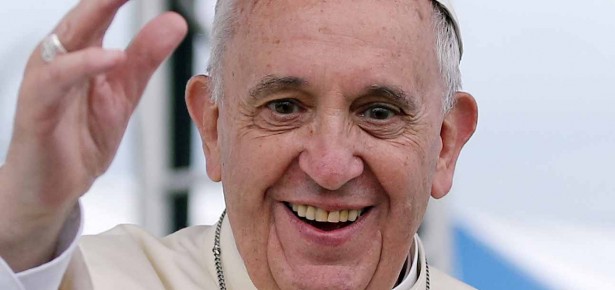
Now that the exhilaration has begun to wane, I am beginning to reflect on the indelible words and images Pope Francis left behind for us here in Philadelphia. Apart from waiting over 3 ½ hours to clear the security checkpoint at the Papal mass on Sunday, I have felt overwhelming joy, deep gratitude, and hope during the Pope’s visit. He said and did so many important things that it is hard to even begin to digest them. It is going to take a long time for us to process Pope Francis’ pilgrimage to the United States – if we do at all. Let me offer here a few initial thoughts.
Three things immediately come to mind in response to these last days. First, Pope Francis demonstrated par excellence why people consider him an incredible pastor. Pope John Paul II and Pope Benedict were masterful teachers, and certainly had their own pastoral sensitivities. However, Francis has touched the hearts of millions of Catholics and members of other traditions in an unparalleled way – at a time when much of the Church and the world are wounded. His warmth, his smile, and his words of encouragement – not without challenges that ask us to change – lift people up rather than tearing them down. Many pundits predicted Pope Francis would come to castigate the consumerist, materialistic, and imperialist power that is the United States given his harsh critiques of neoliberal capitalism and the contemporary “throwaway culture.” He did not. He held up the best of American tradition – such as Lincoln, Martin Luther King, Dorothy Day, and Thomas Merton – while asking us to strive to do better by those marginalized in our society.
While he urged the United States to live up to its responsibilities globally and its own ideals domestically in his speeches to the Congress and in front of Independence Hall in Philadelphia, he did so in a way that resembled a loving parent trying to encourage a child to do better (perhaps after failing a test) rather than giving the child a scolding. In my judgment, this was a brilliant approach – because as a parent I can say that scolding doesn’t work and as an American I know that we as a nation do not take criticism well. As de Tocqueville said long ago, Americans are among the least self-critical people in the world. Pope Francis, with his incredibly kind and generous spirit, manages to be the Vicar of Christ he is called to be, while endearing himself to so many people. And he just accomplished this in a society that has trouble recognizing authority figures, particularly those who seek to give moral guidance.
Second, I am so grateful for Pope Francis’ uplifting of immigrants. He took every opportunity to affirm their belonging, their dignity, their cultures, their histories, and their rights. At a time when Donald Trump and others have baldly stated that most immigrants are unwelcome in the U.S., Pope Francis rightly reminded us that we are all sons and daughters of immigrants here and that immigrants have made and continue to make vital contributions to our society.
Finally, a nagging question has begun to erode my hope. I wonder if we, as a society, will change. Will we take to heart all that Pope Francis taught us in word and deed throughout the last six days? Having lived in Poland during two of Pope John Paul II’s pilgrimages to his homeland in the 1990s, I am doubtful. The unity and euphoria that seemed so evident during those pilgrimages quickly gave way to the kind of rancor and divisiveness that plague so much of American society today. I can only hope that things will be different this time. Or perhaps it is better to wish for something more modest: that at least some of us will change, myself included.
Latest Comments
Have your say!